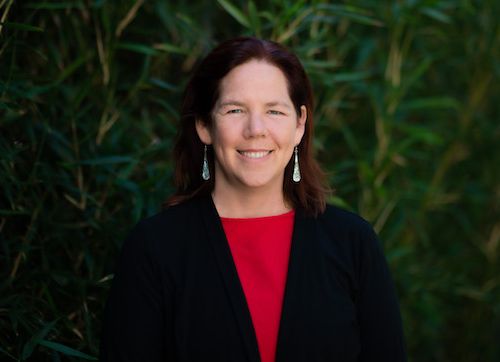What’s Next for Epidemiology?
What’s Next for Epidemiology?
In the first segment of our “What’s Next for Health” series, Maria Glymour, chair and professor of epidemiology, discusses several emerging directions for the field.

On trends that are transforming epidemiology
There are many critical emerging issues for epidemiology, all creating an exciting blur of disciplinary boundaries. Examples include climate change, commercial determinants of health, increasing efforts at creating inclusive scientific communities, and countless important methodological innovations. But I will focus on three trends that are transforming epidemiology:
1. Epidemiologists must more closely integrate with other components of the public health community.
The COVID-19 pandemic brought home the urgency to all of us. It is not enough to simply deliver evidence on the determinants of health and illness, we must also understand what evidence would be useful to public health constituencies. This means delivering accurate, timely answers to the questions that will shape the decision-making of individuals, communities, clinicians, and policymakers. So many decisions—decisions with consequential public health impacts—are made with little available evidence to guide the decision. As researchers, we cannot always ensure that evidence will be used wisely; but history shows that rigorous evidence does influence decision making. It is our job to deliver such evidence.
This can be especially challenging when tackling social determinants of health. The injustices that may seem so obvious to us as epidemiologists that we may feel like the solutions should also be obvious. Sometimes they are obvious, and there is little work for epidemiologists as discovery scientists. But often the answers are not obvious, because systems are complex and multifaceted, people respond in unexpected ways, and we have deeply incomplete or even incorrect understandings of human biology, psychology, and social systems. Thus, we often need rigorous research designs to evaluate whether proposed interventions or policies will improve population health or reduce inequities. I believe that we are far too quick to assume we know the right answer, and hubris is a major pitfall in epidemiology (as it is in all of science).
2. Emerging data sources will allow us to answer new questions and make long-standing methodologic approaches more feasible.
For example, electronic health records are rapidly growing in comprehensive coverage and data interoperability. The power of “found data” is now providing new windows into people’s lived experiences; i.e. data that was not collected for research purposes but accrued in non-research settings—such as clinical notes, social media postings, phone usage, administrative records of police or emergency relief agencies, etc. Rapid increases in computational power are making these complex data sources tractable. This combination will allow more precision, better causal inferences, and more information to guide decisions affecting health and health equity.
If there is one message I wish to convey to students and others, it is this: good epidemiology is difficult.
Likewise, methods for dimension reduction of complex data are critical, crystallizing the themes from thousands, or millions, of measurements. “Big data” is an overused term, but it is extremely important to epidemiology for several reasons. Larger data sets allow us to deliver more precise estimates. Many risk factors, such as environmental toxins, may have small effects on an individual level, but they have population-level health effects. We need those very large data sets to precisely estimate the smaller individual effects. Larger and more diverse samples allow us to explore the impact of heterogeneity within social groups. Additionally, the bias-variance tradeoff implies that many of the most rigorous study designs to support causal inference deliver less precise estimates. There is a built-in loss of statistical power with many modern methods. Very large data sets help offset that loss and allow us to apply methods that in the past were considered intellectually interesting, but not practically informative. Finally—and to me this may be the most transformative implication of the changing data environment—passive accrual of large data sets make randomization more feasible; this has the greatest promise to fill the evidence vacuum and allow us to make informed decisions.
3. Social determinants of health are recognized as powerful and modifiable determinants of health.
Addressing health inequities, including racism, poverty, education, trauma, social connections, and discrimination, is an essential component of modern epidemiology. We increasingly recognize social determinants of health as manifestations of systems that structure inequality. Thus, the distribution of social determinants of health are manifestations of structural racism, systems of political power or marginalization, and larger social processes. Resources and risk factors such as education, wealth, or exposure to racism are not randomly distributed across the population. They are allocated systematically based on intergenerational lines of power. Tackling the social determinants of health must be a cornerstone, not an afterthought, for nearly every domain of epidemiology..
Challenges and opportunities
The scientific challenges are immense, but not entirely new. We have the same causal inference challenges epidemiology has always faced and it is important to remember that the methods, frameworks, approaches, and rigor we have long championed remain highly relevant. If there is one message I wish to convey to students and others, it is this: good epidemiology is difficult. Even a problem that appears simple at the outset, when you consider more deeply the issues of measurement, confounding, selection, and translation of findings, you are likely to realize the problem is difficult.
We also face challenges internally within epidemiology, in our capacity to debate effectively and constructively. Being a scientist entails being wrong a lot of the time. This means that to improve, it is essential to be able to debate, learn, and overturn existing views. And we face challenges externally. As Dean Sandro Galea has discussed, some may perceive public health as an institution serving only some people, especially along socioeconomic, partisan, or geographic lines. When I think of the very rural community where I grew up, and the values and social identities of the people who raised me, compared to the urban academic environment where I now spend most of my time, I worry about this immensely. We must find ways to meet the needs and communicate effectively across every social divide, or we will fail. This is true for epidemiology as it is for every component of public health.
Progress is possible
The public health triumphs of the past century remind us—even in the most challenging times—that progress is possible. The community in the Boston University School of Public Health Epidemiology Department embodies so many of the core strengths that have powered past successes. Principles of scientific rigor and community enable us to learn, even from our mistakes. Our faculty in reproductive epidemiology, the epidemiology of aging, mental health, infectious disease epidemiology, and environmental factors are already taking advantage of the revolutions in data, computation, and causal methods to promote health and health equity. Our research teams are delivering science that is focused on finding practical solutions to current, pressing questions. We have a phenomenal group of researchers within the social epidemiology umbrella who are rigorously evaluating social determinants of health and the reverberating consequences of history for population health. And most of all, through teaching and mentorship, we are investing in a nimble, diverse, and creative public health community.
At the end of the day, enabling our students to field ambitious responses to both emerging and long-standing health challenges is the most important thing we do. BUSPH fully embraces this priority.
